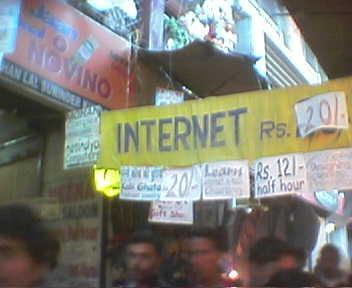India: Microsoft Teams with CAP to Train cyber cafe owners to ensure online safety of children and safe Internet usage.
Microsoft Teams with CAP to Train Victims of Human Trafficking in ITIT News Online Staff2006-05-31Microsoft Corp. India Private Limited, under its Project Jyoti program, has announced a grant of around Rs. 2.2 crore to CAP (Child and Police project), a Hyderabad-based NGO, to provide IT skills training to victims of human trafficking as well as vulnerable communities at risk of trafficking.CAP, along with Delhi-based Prayas and other NGO partners, will engage with these communities to set up a network of 95 Community Technology Learning Centers (CTLCs) across key urban and semi-urban centers in India. The CTLCs will also be located in strategic locations in Nepal, Sri Lanka, Bangladesh and Vietnam.Through this program Microsoft aims to extend the benefits of IT to 38,590 people over the next three years. Additionally with support from the QUEST Alliance, CAP's life skills training curriculum will be digitized to ensure wider distribution. Under the project, training will also be provided to cyber cafe owners to ensure online safety of children and safe Internet usage.Neelam Dhawan, Managing Director, Microsoft Corp. India Private Limited, said, "At Microsoft we are committed to extend the benefits of technology to the grass root level and thereby help build a digitally inclusive India. Our special focus is on the underserved vast majority which risks being on the fringes in terms of IT access. In this context, we are very happy to engage with CAP for enabling IT empowerment of victims of human trafficking. We are confident this skills enhancement will be vital in equipping these individuals to explore sustainable livelihood options."Nalini Gangadharan, Chairperson, CAP, said, "At CAP we strongly believe that economic development and providing the right avenues for employment can help in reducing the risk of human trafficking. The government and voluntary organizations alone cannot provide such opportunities to the underserved sections of the community. It is excellent that companies like Microsoft are coming forward to provide such avenues for growth and development. We look forward to our association with Microsoft in reducing the growth of trafficking in India and the adjoining regions."Rajib Haldar, Executive Director, Prayas, said, "Prayas has been working with the government and various other bodies for a long time to counter the threat of human trafficking. With companies like Microsoft joining the battle, it would provide greater strength and a critical support base to the cause. Microsoft's association in providing IT skills training to the victims and communities vulnerable to trafficking will help us address the problem at its root, by giving livelihood opportunities to the community with high rates of poverty and unemployment."Aakash Sethi, Executive Director, QUEST Alliance, said, "The QUEST Alliance evolved out of a growing convergence of interests among private and public organizations to effectively deal with the problems of quality and relevance in the Indian education system. We are pleased that industry leaders like Microsoft have come forward and taken the lead in bridging the digital divide by providing IT skills training to disadvantaged youth and demonstrate the meaningful role the private sector can play in creating partnerships with civil society organizations."Microsoft said human trafficking has become a matter of grave concern. Poverty and unemployment with almost no access to any opportunities for skills development results in youth, especially women, becoming easy targets for trafficking. With IT becoming an inherent part of any employment opportunity, skills in IT combined with life skills and work readiness programs can be very effective in creating employment opportunities in areas and communities which are most susceptible to trafficking as well as for enabling re-integration of victims of trafficking.The CAP project will begin to roll out in India in June 2006. It is part of a larger regional initiative wherein Microsoft is giving out grants to NGOs to combat human trafficking across six countries in Asia, namely Indonesia, Cambodia, Philippines, Thailand and Singapore, besides India. This regional initiative focuses on the strengths of several Microsoft programs on the complex issue of exploitation and abuse. Designed to enhance local and international efforts to end trafficking in persons, the initiative works in conjunction with governmental, NGO and other corporate partners and includes support for awareness, prevention, enforcement and re-integration programs.
http://www.itnewsonline.com/showstory.php?storyid=4119&scatid=8&contid=1
